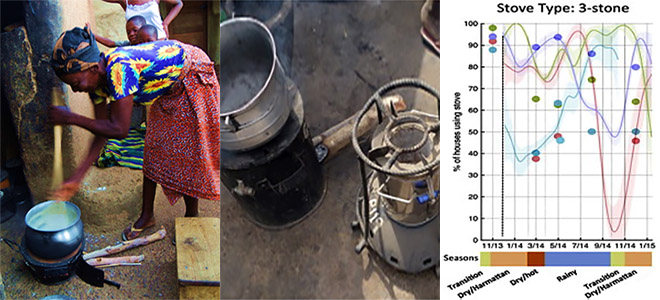
by R. Piedrahita, K.L. Dickinson, E. Kanyomse, E. Coffey, R. Alirigia, Y. Hagar, I. Rivera, A. Oduro, V. Dukic, C. Wiedinmyer, and M. Hannigan
Energy for Sustainable Development
Volume 34, October 2016
Abstract: Biomass burning for home energy use is a major health and environmental concern. While transitioning to cleaner cooking technologies has the potential to generate significant health and environmental benefits, prior efforts to introduce improved cookstoves have encountered many hurdles. Here, we focus on the increased stove use hurdle; households tend to use improved stoves alongside their traditional stoves rather than replacing them entirely, a phenomenon called cookstove “stacking.” This work provides a systematic, multi-method assessment of households’ cooking behaviors and cookstove stacking in the context of a 200-home randomized cookstove intervention study in Northern Ghana. Two stoves were selected for the intervention, a locally made rocket stove (Gyapa) and the Philips HD4012 LS gasifier stove. There were four intervention groups: a control group, a group given two Gyapa stoves, a group given two Philips stoves, and a group given one of each. Two stoves were distributed to each home in an attempt to induce more substitution away from traditional stoves. Adoption and usage patterns were quantified using temperature loggers at a subset of homes, as well as quarterly surveying in all households. We find that using multiple stoves each day is common practice within each intervention group, and that the two groups given at least one Gyapa had the largest reductions in traditional stove use relative to the control group, though use of traditional stoves remained high in all groups. Read more …

